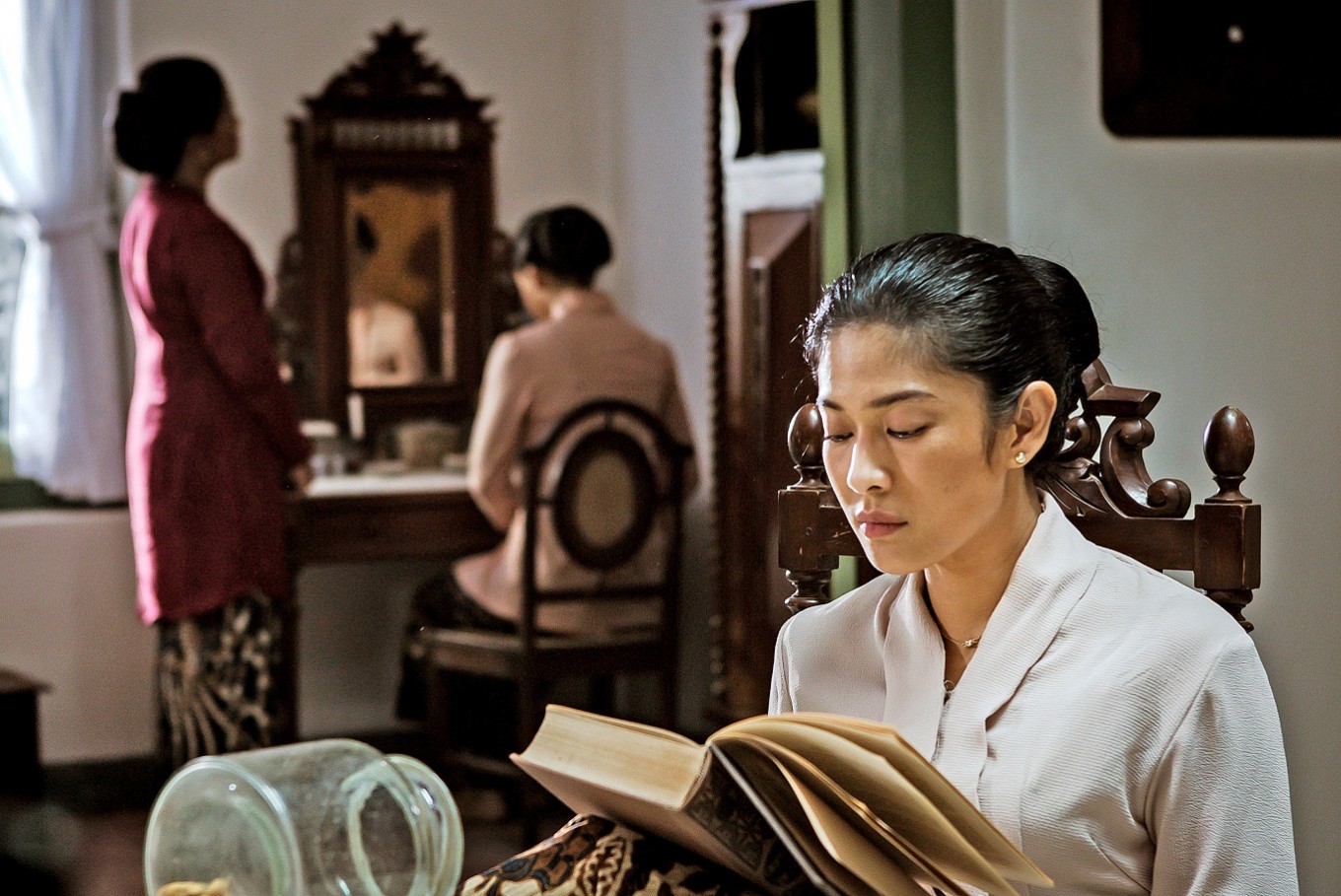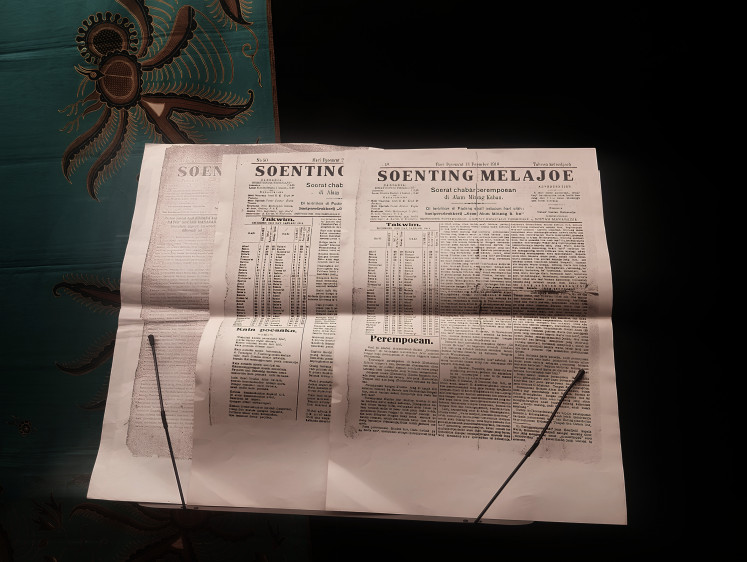Unravelling Kartini's story and thoughts
Kartini is more than just a one-dimensional figure. Her story and legacy deserve to be celebrated every day, not just once a year.
Change text size
Gift Premium Articles
to Anyone
 Window to the world: Kartini, played by Dian Sastrowardoyo, is allowed to read books in Dutch sent by her brother during her marriage confinement. (Legacy Pictures/File)
Window to the world: Kartini, played by Dian Sastrowardoyo, is allowed to read books in Dutch sent by her brother during her marriage confinement. (Legacy Pictures/File)
I
want to thank Hanung Bramantyo for adapting the story of Indonesia’s feminist figure Kartini to screen last year. Just like every other great movie, Kartini teaches viewers more than a textbook ever could.
I knew that she was born to a noble family in Jepara, Central Java. Yet, one thing I didn't know was that she was not born to a noblewoman. Her mother, Ngasirah, was a commoner who was one of the concubines of Kartini’s father.
Despite her mother’s status, Kartini was privileged enough to go to school until she entered pingitan (period of seclusion). Pingitan started when a noble woman started menstruating and continued until a nobleman asked for her hand in marriage.
Hanung Bramantyo captured her struggle in the very beginning of the movie. From the very first part of the film, I realized that lessons on Kartini in school barely scratched the surface. I never had a chance to learn a great deal about her. In fact, it was also because of the movie that I was became intrigued and wanted to further unravel Kartini.
In the third part of the film, Kartini changed her mind about a scholarship application she had previously submitted. Kartini, who resented polygamy and longed to be liberated from her Javanese culture, accepted a marriage proposal from the regent of Rembang, Raden Adipati Joyodiningrat, even though it meant giving up all hope of a scholarship. In the film, she saw this as a sacrifice that would enable her to establish a school for women. But honestly, I just couldn’t buy that a person as determined as Kartini would do that.
Read also: Why many 'Kartini' study abroad: A reflection from Australia
Hanung Bramantyo’s screen adaptation made me think and prompted me to do a little research of my own. I came up with RA Kartini’s collection of letters titled Habis Gelap Terbitlah Terang (Through Darkness to Light) and Pramoedya “Pram” Ananta Toer’s Panggil Aku Kartini Saja (Just Call Me Kartini), which became the inspiration of Hanung. Having read two of the books, I still could not find a clear answer on why Kartini changed her mind.
First, Pram’s book is not complete because some chapters were burned during the New Order era. We never got to see whether Pram analyzed Kartini’s drastic stance. Second, Kartini’s collection of letters is not complete because it was documented by her Dutch friend Abendanon.
Even in an interview with journalist Desi Anwar, Hanung admitted that he couldn’t understand why Kartini canceled her study plan and accepted the proposal. That was when he had to create his own story, where the art of fiction storytelling played a part.
When I reread Pram’s book again, the epilogue mentioned Sitisoemandari Soeroto’s Kartini: A biography. It was written during the 1970s and the author managed to interview Kartini’s younger sister, Kardinah.
The book answered my question. Simply said, Abendanon had political interests in not encouraging Kartini to study in the Netherlands. Sitisoemandari argued that Abendanon faced threats from local regents in Java to not permit an Indonesian woman to study abroad. They were afraid that Kartini may reveal the injustices of colonialism in Indonesia.
The ironic part was that Kartini looked up to Abendanon. Her words mattered to her and she managed to convince her to stay. She told Kartini that she didn’t have to go to the Netherlands but could educate young commoner women in Java, that she could build her own school with the full support of the local government and that she could obtain a teaching degree in Batavia (Jakarta) if she wished, which Kartini accepted.
Kartini then changed her mind. She was going to go to school, only not in the Netherlands. Nobody really knew why Kartini changed her mind. Probably because the advice came from a person she respected so much that she took it as if it were her own voice.
But at the end of the day, Kartini never really went to any school because of the proposal from her future husband. From her letters, we can see that she contemplated this point a lot. She was 24 years old at the time, which was considered old for a noblewoman to marry. It was also considered a disgrace if a woman never married. At that time, her father had been sick for quite some time.
While it is not known whether this was the only reason she accepted the marriage proposal, she said in her letters that it was a sacrifice that she was willing to make. In her letters, she said her husband would support her dream to build a school for women. Hence, she changed her mind.
Kartini was a determined young woman filled with big dreams and ambitions. Yet, she surrendered herself by bowing to patriarchy. She not only sacrificed her long-held dream to be liberated, she contradicted her own values and stance on polygamy and feudalism.
Read also: Insight: Kartini and the everlasting fight for gender parity
Kartini might seem like a contradiction filled with mystery that we know nothing about, but above all that, she was a woman whose sacrifice resulted in lasting sustainable change. Kartini may have lost a battle, but she won a war. Look how far we have come. Her aspirations were never as simplistic as women versus men. They revolved around battles between being tied down and being liberated, a battle against colonialism and feudalism.
Kartini is more than just a one-dimensional figure. Her story and legacy deserve to be celebrated every day, not just once a year. (dev/mut)
***
The writer is a film enthusiast who occasionally reviews Indonesian films.









